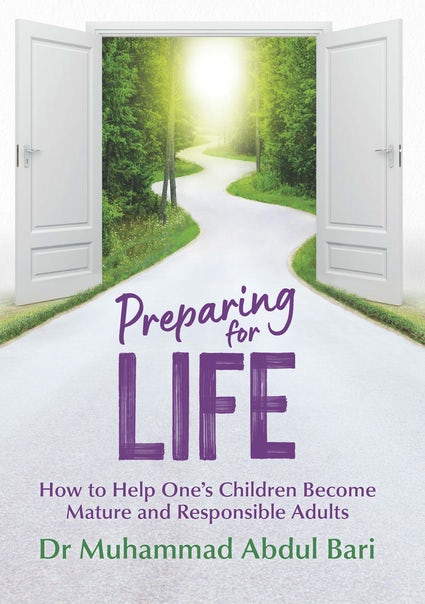
Author: Dr Muhammad Abdul Bari
Publisher: Kube Publishing
Year: 2022
Pages: 118
ISBN: 9781847741868
Source: https://www.kubepublishing.com/products/preparing-for-life?_pos=1&_sid=ece3afebe&_ss=r
Dr. Bari describes how, in times of complexity and uncertainty; strong families and community solidarity are essential bulwarks to enable children to flourish and emerge as confident and caring members of society. Young people in developed societies are growing up in a climate where individualism, self-indulgence and consumerism prevails. Social media has altered human interaction, but “the clock cannot be turned back”. For young Muslims, there are added complexities that makes it essential “that Muslim parents and the community invest in their children’s education and character building in a more planned way”.
Throughout, the advices refer to the social realities as well as the Islamic framework that categorises upbringing in three phases: “the first seven years are about engaging them in physical activities; the second seven years are about instructing them; and the following seven years are about being friendly with them and monitoring them wisely.” However, Dr. Bari also looks beyond, because the task of parenting is “a life-long commitment”. The relationship changes from one of dependence to interdependence. So responsible parents must not shy from involvement in the marriages of their adult children: “they have a moral right to see that their beloved ones do not make mistakes when choosing their life partners.”
At the heart of his message for families is communication and consistency. Ideally, “Muslim parents need to be aware of what is going on in their children’s world and discuss juvenile issues with warmth and a sense of urgency at home and in community institutions. They must devote quality time . . . “. At every stage of a child’s progress, from babyhood to adulthood, the onus is on the parents to maintain an open and friendly channel with their offspring. He calls for some quality time to be devoted for this, notwithstanding busy lives. The ‘how to’ steps would be for parents to carve out time in a planned, regular way, “this could be every day, for about fifteen minutes, with pre-adolescent children, and at least for half an hour once a week with secondary school-age children . . . [they] should be allowed to talk freely and frankly; each parent should give full attention to what his or her child says.” When discussing topics of family values or contemporary issues, children could be asked to give their opinion, “if done effectively, this will enhance the ethos of consultation in children and improve their confidence. Children may be given the task of listing ideas on behalf of their parents which can then be prioritised to a manageable number of around five tasks and displayed in a prominent place”. An excellent starting point for such a family conclave could be the book’s section ‘Helping one’s children to find true friends’. Other options for family bonding could be “shopping or visiting interesting places together, frequent eating together and regular family sessions.”
In the face of adolescents’ unreasonable and disruptive behaviour, “parents need to show their utmost love, patience and empathy . . . [they] must adapt with this situation and change their attitudes and habits towards them positively; they should consider their adolescents as individuals in their own right . . . children are under enormous pressure to conform to the youth culture of the day. The best strategy in this phase is adopting a positive, rational and flexible attitude, one which is polite but assertive.” Dr. Bari explains what he means by this ‘tough love’ approach.
When setting boundaries and rules, parents should explain their position, listen to their children’s opinions and then compromise where and when needed. Dr. Bari adds, “whatever children’s misbehaviour is and regardless of its cause, parents should avoid shouting and angry exchanges with their children . . . Respect goes both ways, so parents should speak with their children the way they wish them to speak with them . . . Parents’ outbursts are demeaning and undermine their authority in the eyes of their children. A parent who struggles with controlling his or her anger should learn anger management.”
Parents must practice what they preach because they are role models. Similarly, when family rules and boundaries are mutually agreed, then consistency is important: “when parents waver or become inconsistent about family rules, children will realise that they can push the boundaries further next time. Inconsistency conveys to the children the negative message that parents are not certain about what they are asking of them.”
This book calls on community institutions to be partners in good parenting, for example by finding creative ways of engaging with young people, providing pre-marital advice and running parenting courses. It is characteristic of Dr. Bari’s wide-ranging and forward-thinking approach that he also calls on parents to introduce their children to Muslim history in Europe to “improve their rootedness in European soil ad people of faith from the Abrahamic tradition.” The book distils the lifelong experience of an educationalist, parent (and grandparent), parenting tutor and civic activist. It describes ideal practices, with frequent practical tips on how these can be implemented.
Jamil Sherif, March 2022
